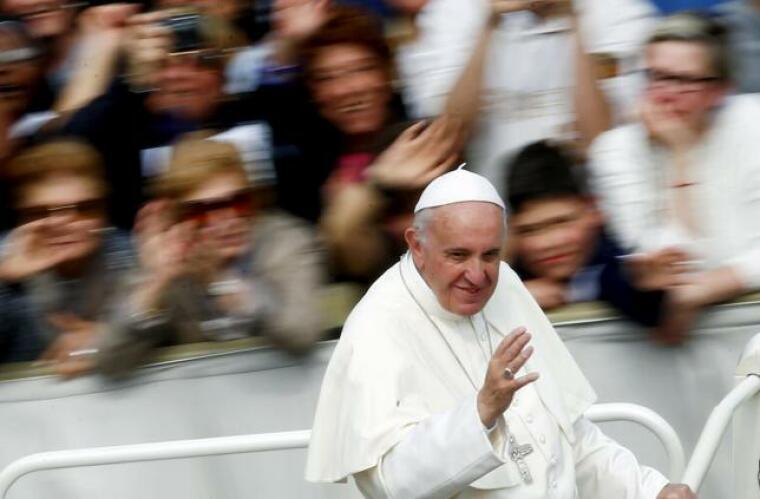Pope Francis embraces Egypt senior Muslim imam, ends 5-year freeze in relations
Pope Francis embraced the grand imam of Cairo's al-Azhar mosque at the Vatican on Monday, May 21 in a grand gesture of reconciliation and unity after relations turned sour five years ago.

"Our meeting is the message," Francis told reporters after the kiss and embrace at the start of his meeting with the highest authority in Sunni Islam, Sheikh Ahmed al-Tayeb, as reported by The Guardian.
"We need to take a joint stance, hand in hand, to bring happiness to humanity," read a statement from al-Azhar where Tayeb was quoted telling the pope.
"Divine religions were revealed to make people happy, not to cause them hardship," Tayeb was further quoted.
Tayeb's visit, which included a 30-minute dialogue with the pontiff and just over an hour in the Vatican, was the first after five years since the 1,000-year-old mosque and university center froze relations with the Vatican following the September 2006 speech given by Benedict XVI, Francis' predecessor.
The now-retired Benedict has provoked anger among the Muslims worldwide when he quoted what a Christian emperor said 600 years ago about Prophet Muhammad.
"If it were not for these good positions the meeting would not be happening," Abbas Shuman, the imam's deputy, shared with Egyptian TV Channel CBC.
The Argentine pope works to improve inter-faith relations since his election to the papacy in 2013 as he meets with leaders of other religious faiths whenever he visits non-Christian countries. In April, Francis brought back with him to the Vatican three Syrian families from his visit to migrant-packed Lesbos.
Shuman revealed that the two leaders have agreed to continue their dialogue on issues of poverty, extremism and terrorism. He also said that the imam is intent on promoting "true Islam and to correct misunderstandings created by extremist terrorist groups."
"He encourages countries not to deal with their Muslim citizens as groups that present a threat," Shuman said. "And he encourages Muslims in Western society to meld with their societies ... it is a message for both sides."
 Christians don't have to affirm transgenderism, but they can’t express that view at work: tribunal
Christians don't have to affirm transgenderism, but they can’t express that view at work: tribunal Archaeology discovery: Medieval Christian prayer beads found on Holy Island
Archaeology discovery: Medieval Christian prayer beads found on Holy Island Presbyterian Church in America votes to leave National Association of Evangelicals
Presbyterian Church in America votes to leave National Association of Evangelicals Over 50 killed in 'vile and satanic' attack at Nigerian church on Pentecost Sunday
Over 50 killed in 'vile and satanic' attack at Nigerian church on Pentecost Sunday Ukrainian Orthodox Church severs ties with Moscow over Patriarch Kirill's support for Putin's war
Ukrainian Orthodox Church severs ties with Moscow over Patriarch Kirill's support for Putin's war Islamic State kills 20 Nigerian Christians as revenge for US airstrike
Islamic State kills 20 Nigerian Christians as revenge for US airstrike Man who served 33 years in prison for murder leads inmates to Christ
Man who served 33 years in prison for murder leads inmates to Christ


 Nigerian student beaten to death, body burned over ‘blasphemous’ WhatsApp message
Nigerian student beaten to death, body burned over ‘blasphemous’ WhatsApp message 'A new low': World reacts after Hong Kong arrests 90-year-old Cardinal Joseph Zen
'A new low': World reacts after Hong Kong arrests 90-year-old Cardinal Joseph Zen Iran sentences Christian man to 10 years in prison for hosting house church worship gathering
Iran sentences Christian man to 10 years in prison for hosting house church worship gathering French Guyana: Pastor shot dead, church set on fire after meeting delegation of Evangelicals
French Guyana: Pastor shot dead, church set on fire after meeting delegation of Evangelicals ‘Talking Jesus’ report finds only 6% of UK adults identify as practicing Christians
‘Talking Jesus’ report finds only 6% of UK adults identify as practicing Christians Mission Eurasia ministry center blown up in Ukraine, hundreds of Bibles destroyed: 'God will provide'
Mission Eurasia ministry center blown up in Ukraine, hundreds of Bibles destroyed: 'God will provide' Church holds service for first time after ISIS desecrated it 8 years ago
Church holds service for first time after ISIS desecrated it 8 years ago Burger King apologizes for 'offensive campaign' using Jesus' words at the Last Supper
Burger King apologizes for 'offensive campaign' using Jesus' words at the Last Supper Uganda: Muslims abduct teacher, burn him inside mosque for praying in Christ’s name
Uganda: Muslims abduct teacher, burn him inside mosque for praying in Christ’s name